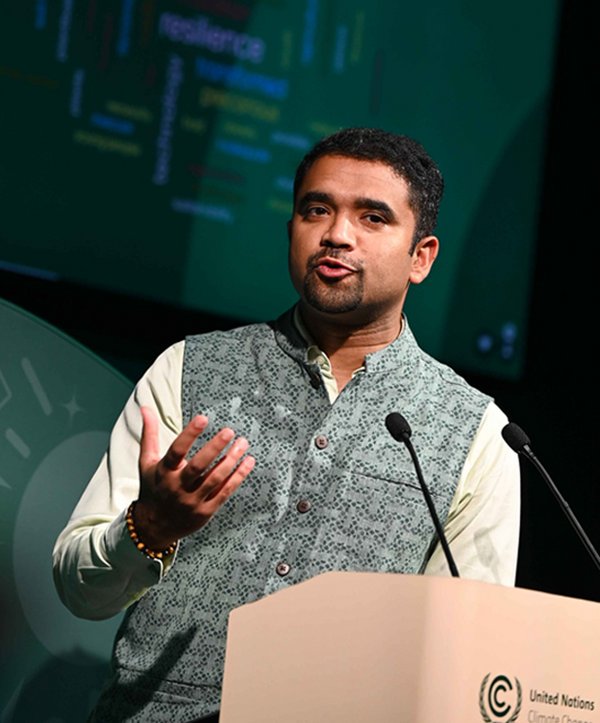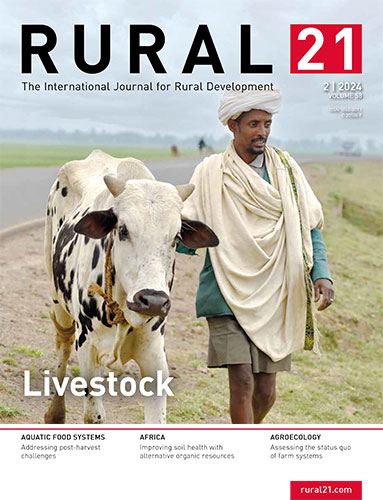Dhanush Dinesh is the Chief Climate Catalyst of Clim-Eat, a think and do tank for food and climate which he founded at COP26. Clim-Eat seeks to accelerate food systems transformation under climate change by serving as a bridge between the food and climate communities, mobilising knowledge and connecting it to action through policy and practice.
Photo: Clim-Eat
- Share this article
- Subscribe to our newsletter
If we really want to tackle climate change, we must first tackle the United Nations
This week, thousands of people will attend the UN’s Bonn Climate Change Conference. It aims to set the agenda for international negotiations at COP29 in Azerbaijan in November and will feature a flurry of side events, meetings and discussions.
I’m told that over 10,000 people sought accreditation this year – far greater than last year and far beyond the capacity of Bonn’s World Conference Center. This is in keeping with ballooning attendance at such events. COP28 in Dubai last year attracted a record-breaking 83,884 people (with badges).
While it’s great that so many people are keen to take action on climate change, this begs a more fundamental question: Do these conferences – and the UN negotiations they support – actually achieve anything substantive?
Tracking the progress of negotiations
In a recently published peer-reviewed article, my colleagues and I decided to investigate. We tracked the progress of official negotiations on food and agriculture since 2006 – this was when the UN formally acknowledged the need for targeted action in agriculture, which both contributed to climate change and were likely to suffer from it.
Surely, 17 years was enough time for some action to have been taken. But no. We found that these conferences have provided little more than false optimism and empty promises. Also worrying was the growing influence of special interest groups in hijacking official agendas.
While we observed numerous steps in the process, like decisions, workshops, views of countries and organisations being submitted, and announcements, we haven’t observed results.
Little action was taken to reduce greenhouse gas emissions from agriculture and enhance farmers' resilience. Meanwhile, emissions from agri-food systems continued to rise, and increasing temperatures also posed significant challenges to food production.
We concluded that the process had taken over the purpose of the negotiations. Each year, we go through the motions of one conference after another, while actual progress on the issues these conferences were established to tackle has somehow been forgotten. We concluded that the UN climate change process had failed – at least in relation to food and agriculture.
Change must start with the process
This is a continuing source of anxiety for my colleagues and me, who have spent most of our professional lives working in agriculture and food systems. We’ve been involved in numerous scientific studies on climate change, and each year, we fail to see the very compelling results reflected in any tangible action taken via UN negotiations.
That’s why I believe continuing to invest time, money and hope in the UN’s climate change process is a wasted effort. Instead, we should be calling for significant reforms.
Based on our findings, we suggest:
- The UN focuses on measuring results and the impact delivered from climate change negotiations. Specifically, the UN Framework Convention on Climate Change – the agency that convenes negotiations – needs to stop acting as a “mega-meeting” organiser and become a watchdog that ensures action by state and non-state actors.
- The annual climate change COPs should be made leaner. In a world starved of climate finance, spending hundreds of millions of euros on meetings each year is unacceptable. Germany and the UK spent over 100 million euros and 300 million euros for COP23 and COP26, respectively. We suggest that the COPs be scaled down to receive fewer participants and organised every two years instead. They should focus on working meetings that deliver results instead of being de facto trade fairs that give false optimism to the wider public.
- Transparency on the costs, participation and emissions of the COPs themselves is needed to ensure that the UN is more accountable to the public. This is also crucial to protecting the UN process from the influence of host countries' priorities, lobbyists and private consultancies.
Now, while the Bonn climate talks take place, is the ideal time to have this conversation.
Contact: dhanush(at)clim-eat.org





Add a comment
Be the First to Comment